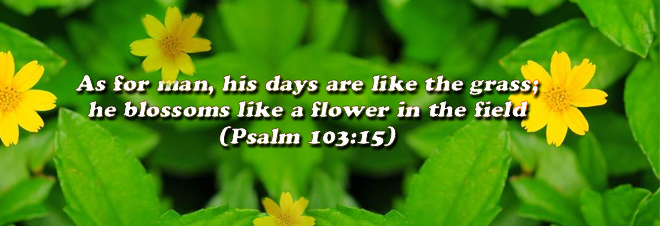Pulong ng Editor
Pulong ng Editor

For the Beauty of the Earth, arranged by John Rutter.
Your editor is not the most organized person in the world. But often enough, from the ‘disorder’ that this causes, things come together in an unexpected but orderly way. The editorial staff suggested a photo by Benjo Rulona for our January-February cover and your editor found an appropriate verse from Psalm 103: As for man, his days are like the grass; he blossoms like a flower in the field.
Not finding any inspiration for this column, your editor stumbled across the video above of For the Beauty of the Earth in an arrangement by contemporary English composer John Rutter. It seemed to tie in with the cover photo and verse.
And in the First Reading for the Feast of the Baptism of the Lord, this year on 11 January, includes these beautiful verses from Isaiah that draw on nature to show us something of God’s love:
Yet just as from the heavens
the rain and snow come down
And do not return there
till they have watered the earth,
making it fertile and fruitful,
Giving seed to the one who sows
and bread to the one who eats,
So shall my word be
that goes forth from my mouth;
It shall not return to me empty,
but shall do what pleases me,
achieving the end for which I sent it. (Is 55:10-11, NABRE).
It is impossible for God’s word not to bear fruit, just as it is impossible for seeds that get the proper amount of rain and sunshine not to grow, unless we reject it. The Prophet Isaiah speaks of the word that goes forth from my mount but St John in the magnificent opening to his Gospel tells us Who the Word is:
And the Word became flesh
and made his dwelling among us,
and we saw his glory,
the glory as of the Father’s only Son,
full of grace and truth (John 1:14).
Jesus, the Word who became flesh, often drew his listeners closer to God by drawing their attention to aspects of God’s creation.
The Book of Genesis shows us how everything that God has created is inter-related and how all creatures give glory to him by being what they are. And we humans, created by God in his image, unlike any other creature, have a particular responsibility towards everything that God has made. And we whom God has gifted with faith have a responsibility to make the Word made flesh known to every other human being as a matter of urgency.
Pope Francis in Evangelii Gaudium, The Joy of the Gospel (No 259) tells us that Spirit-filled evangelizers means evangelizer fearlessly open to the working of the Holy Spirit . . . Jesus wants evangelizers who proclaim the good news not only with words, but above all by a life transfigured by God’s presence.
The Holy Spirit gives some the gift of creating order and some the gift of finding order in ‘disorder’. The latter could not use their gift without the former using theirs and God calls each of us not only to rejoice in and use the particular gifts he has given us but to rejoice in gifts that others have that we don’t have; to rejoice in the fact that the gifts of others enable us to use ours and our gifts enable them to sue theirs.
In the words of American songwriter Bill Staines, All God’s Creatures Got a Place in the Choir.
